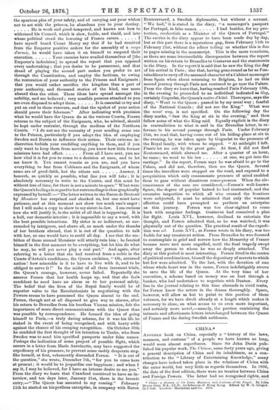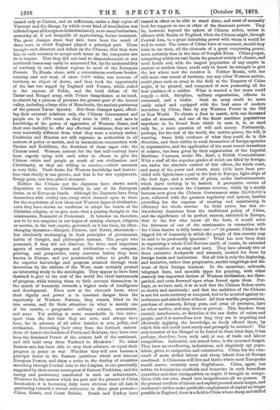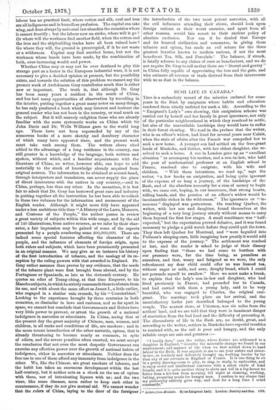CHINA.*
ANOTHER book on China, especially a " history of the laws, manners, and customs " of a people we have known so long, would seem almost superfluous. Since Sir John Davis pub- lished his popular work, The Chinese, some forty years ago, giving a general description of China and its inhabitants, as a con- tribution to the " Library of Entertaining Knowledge," many changes have indeed taken place in the relations of China with the outer world, but very little as regards themselves. In 1836, the date of the first edition, there were no treaties between China and Foreign Powers. The latter had no recognised rights, and • China : a History of the Lams, Manners, and Customs of the People. By John Henry n Gray, Archdaeadr joo 1 of Hong Kong. Edited by W. G. Gregor. traded only at Canton, and on sufferance, under a dual regime of Viceroys and Co-Hongs, by which every kind of humiliation was inflicted upon all foreigners indiscriminately, as so many barbarians, unworthy of, if not incapable of appreciating, better treatment. The great changes since that date have been the result of three wars, in which England played a principal part. These brought such disasters and defeat on the Chinese, that they were fain on each occasion to accept such terms as the conqueror saw fit to impose. That they did not lead to dismemberment or any territorial losses may easily be accounted for, by the undesirability of territory in such distant regions to most of the European Powers. To Russia alone, with a coterminous northern border, running east and west, of some 2,000 miles, was increase of territory an object of desire, and they took the opportunity of the last war waged by England and France, which ended in the capture of Pekin, and the total defeat of the Tartar and Mongol army, with Prince Sangolinsen at its head, to absorb by a process of pressure the greater part of the Amoor valley, including a large slice of Manchuria, the ancient patrimony of the present Tartar dynasty. But these changes apart, affect- ing their external relations only, the Chinese Government and people are in 1878 much as they were in 1838 ; and save in knowledge of the power of aggression of Western States, and their own inability to offer any effectual resistance, they are not very materially different from what they were a century earlier. Confucius and Mencius are still supreme as authorities in all matters of policy or morals, and in harmonious conjunction with Taoism and Buddhism, the doctrines of these sages rule the Chinese mind. Western nations for the last half-century have been eagerly vying with each other in efforts to give the Chinese rulers and people as much of our civilisation and Christianity, as they are willing to receive,—which amounts to very little. Their desire for Western knowledge and instruc- tion runs chiefly in one groove, and that is for war equipments, Krupp guns, and iron-plated steamers.
Neither the Chinese nor the Japanese have shown much disposition to receive Christianity in any of its European forms, or at European hands. Although the Japanese have flung themselves with avidity into every other channel open to them for the acquisition of new ideas and 'Western types of civilisation, even they have shown no readiness to adopt the tenets of the Christian religion, or to give more than a passing thought to the missionaries, Romanist or Protestant. It behoves us, therefore, not to be too sanguine in our hopes of coming changes, religious or secular, in the vast empire, governed, as it has been, by often- changing dynasties—Mongol, Chinese, and Tartar, alternately— but absolutely unchanging in their principles of government, habits of thought, and philosophic systems. The people who possessed, if they did not discover, the three most important agents of modern progress and civilisation — the compass, printing, and gunpowder, many centuries before they were known in Europe, and yet persistently refuse to profit by the superior knowledge and progress attained through these inventions by the nations of the West, must certainly present an interesting study to the sociologist. They appear to have been destined to give to the rest of the world the chief instruments of progress, while turning them to little account themselves in the march of humanity towards a higher scale of intelligence and development. Even now at the eleventh hour, when their dignity and power is in constant danger from the superiority of Western Nations, they remain blind to its true source, and fix their attention on what is merely one of the results, — progressive military science, armaments, and arms. Yet nothing is more remarkable in this retro- spect than the fact that they are now, and always have been, far in advance of all other Asiatics in arts, polity, and civilisation. Extending their sway from the furthest eastern shore of Asia to the borders of Persia and Bokhara, they have ever been the dominant Power of the eastern half of the continent, and still hold sway from Yarkand to Moukden ! No other Eastern race has been able to stop their advance, or equal their progress in peace or war. Whether they will ever become a principal factor in the Eastern questions which now interest European Powers, and claim a voice in the destiny of countries stretching through Central Asia to the Caspian, is one practically suggested by their recent reconquest of Eastern Turkistan, and the energy and persistency manifested in such an achievement. Whatever be the answer which the past and the present of China foreshadow, it is becoming daily more obvious that all Asia is gravitating towards a virtual subjection to three great powers— China, Russia, and Great Britain. Persia and Turkey have ceased in effect to be able to stand alone, and must of necessity look for support to one or other of the dominant powers. They lie, however, beyond the sphere of Chinese action, unless in alliance with Russia or England, when the Chinese might, through Central Asia, be a great disturbing power with whom it would be well to count. The rulers of China have at command, should they learn to use them, all the elements of a great conquering power, more certainly than in the time of Genghis Khan. China proper, comprising within its vast limits the greatest variety of climate, and most fertile soil, with the largest population of any empire in ancient or modern times, needs only to know its strength to give the law where now she receives it. Neither Russia, with her still more vast extent of territory, nor any other Western nation, could place such an army in the field as the Emperor of China might, if he pleased, and composed of men possessing all the best qualities of a soldier. What is wanted a few years could supply — drill, discipline, military organisation, officers to command, and a leader. Such an army could be more easily raised and equipped with the best arms of modern invention by China, than by any Western Power in the Old or New World. To obtain a fleet to match, with one thousand miles of seacoast, and one of the finest maritime populations anywhere to be found from which to man it, is, or need only be, a mere question of will and money. Fortunately, perhaps, for the rest of the world, the motive-power, the will, is wanting. Some little evidence of what they could do in this direction, and their ability to avail themselves of foreign agencies in organisation, and the application of the most recent inventions of science, has been given by their organisation of the Imperial Maritime Customs, under Mr. Hart, a British Commissioner. With a staff all the superior grades of which are filled by foreign. ers, under the absolute control of this officer, the whole coast, and many of the ports and rivers, since 1859, have been pro- vided with lighthouses equal to the best in Europe, light-ships of the best type, and a service of pilots, under harbourmasters, which leave nothing to be desired. A preventive service of swift steamers secures the Customs revenue, which by a steady increase now gives the Chinese Government some £4,000,000 a year, collected with the greatest regularity and system, besides providing for the expense of creating and maintaining in efficiency the whole service. So little notice has this ex- traordinary departure from the traditional policy of China, and the significance of its perfect success, attracted in Europe, that to the few who know all the facts, it would seem the utterance of one of the missionaries in connection with the China famine is fully borne out :—" At present, China is the biggest bit of humanity in which the people of this country may be said to be profoundly ignorant." What has now been done in organising a whole Civil Service could, of course, be extended to the creation of an army and navy. They have already two or three extensive dockyards and arsenals, created for them by foreign heads and instructors. But all this is only the beginning, and tentative, rather than progressive, amidst misgivings and dis- trust of their foreign teachers. In the meantime, railroads, telegraph lines, and movable types for printing, with other scarcely less important factors of Western civilisation, are disre- garded, and even frowned upon when forced upon them. Per- haps, as we have said, it is as well that the Chinese Rulers move so slowly and cautiously ; and that the ambition of the Chinese is not for more territory or conquest, but to be secured against in- terference and attack from without. All their warlike preparations, purchase of steamers, Krupp guns, and arms of precision, have no other motive, and stop there at present. This freedom from control, interference, or dictation is the one desire of rulers and people, and it is marvellous how long they are in acquiring and effectually applying the knowledge, so freely offered them, by which this end could most surely and promptly be attained! The only invasion of the Mongol to be feared in these later days, it has perhaps, therefore, been truly said, is one of trade and labour competition. Industrial, not armed force, is the menaced danger. They have an overflowing, industrious, and singularly apt popu- lation, given to emigration and colonisation. China has the com- mand of more skilled labour and cheap labour than all Europe combined. A Chinaman will live and thrive where most Europeans would starve, certainly most Englishmen. China, again, has within its boundaries coalfields and ironstone in such boundless quantities and close juxtaposition as might, if brought in compe- tition with our own, dwarf into insignificance all we possess. If the present conflicts of labour and capital proceed much longer, and workmen's strikes make profitable employment of capital no longer possible in England, there is a field in China where cheap and skilled
labour has no practical limit, where cotton and silk, coal and iron are all indigenous and in boundless profusion. The capital can take wing, and does always by universal law abandon the countries where it cannot fructify ; but the labour now on strike, where will it go ? Or where will the workmen find another field, when the cotton and the iron and the shipbuilding trades have all been ruined here ? Go where they will, the ground is preoccupied, if it be not waste or a wilderness. Capital may find another home, but not the workmen whose hands have here made, by the combination of both, ever-increasing wealth and power.
Whether China may or may not be ever destined to play this strange part as a factor in the European industrial wars, it is not
necessary to give a decided opinion at present, but the possibility exists, and towards the solution of this problem we cannot say the present work of Archdeacon Gray contributes much that is either new or important. The truth is, that although Dr. Gray has been many years a resident in the south of China, and has had many opportunities of observation by travelling in the interior, putting together a great many notes on many things, he has only produced a book which may interest and instruct the general reader who has not been in the country, or read much on the subject. But it will scarcely enlighten those who are already familiar with the more systematic works on China which Sir John Davis and Dr. Wells Williams gave to the world long ago. These have not been superseded by any of the numerous books of a more sketchy and desultory character of which many have appeared since, and the present work must take rank among them. The writers above cited added to the advantage of a long residence in the country, one still greater in a knowledge of the language, both written and spoken, without which, and a familiar acquaintance with the literature of China, no writer, however able, can hope to add materially to the stock of knowledge already acquired from original sources. The information to be obtained at second-hand, through interpreters and translators, can never supply the place of direct intercourse with the natives in any country,—and in China, perhaps, less than any other. In the meantime, it is but fair to admit that Dr. Gray has bestowed great care and industry in putting together all the instruction he has been able to collect in these two volumes for the information and amusement of the English reader. Although it might more fitly have appeared under a less ambitious title than " A History of the Laws, Manners, and Customs of the People," the author passes in review a great variety of subjects within this wide range, and by the aid of 140 illustrations, from native sources, as we infer by their char- acter, a fair impression may be gained of some of the aspects presented by a people numbering some 400,000,000. There are indeed some special features affecting the character of the people, and the influence of elements of foreign origin, upon both rulers and subjects, which have been prominently presented in an original manner. We may give as an instance his history of the first introduction of tobacco, and the analogy of its re- ception by the ruling powers with that awarded in England. Dr. Gray rather assumes than proves by any evidence, that the seeds of the tobacco plant were first brought from abroad, and by the Portuguese or Spaniards, as late as the sixteenth century. He quotes an edict of Tsung-ching, at that time Emperor, to his Manchu subjects, in which he strictly commands them to abstain from its use, and with about the same effect as James I., a little earlier, who engaged in a similar vain crusade, by his " Counterblast" Looking to the experience brought by three centuries in both countries, so dissimilar in laws and customs, and so far apart in space, we cannot but conclude that Governments and Rulers have very little power to prevent, or arrest the growth of a national indulgence in narcotics or stimulants. In China, seeing that at the present day the great majority of Chinese, men, women, and children, in all ranks and conditions of life, are smokers ; and in the more recent introduction of the other narcotic, opium, that is already threatening to become nearly as common, in spite of edicts, and the severe penalties often enacted, we must accept the conclusion that not even the most despotic Government can exercise any effective power over the growth of national habits of indulgence, either in narcotics or stimulants. Neither does the free use in one of these afford any immunity from indulgence in the other. We, like the Chinese, are great smokers of tobacco, and the habit has taken an enormous development within the last half-century, but it neither acts as a check on the use of opium with them, nor of intoxicating liquors with us ; and the two vices, like some diseases, seem rather to keep each other in countenance, if they do not give mutual aid. We cannot wonder that the rulers of China, laying to the door of the foreigner
the introduction of the two most potent narcotics, with all the evil influences attending their abuse, should look upon foreign nations as their worst enemies, and apart from all other reasons, would fain revert to their ancient policy of absolute exclusion. Nor can it be denied that Europe and its boasted civilisation and commerce, in giving them tobacco and opium, has made an evil return for the three greatest luxuries known to modern nations, if not the most beneficent Tea, Silk, and Porcelain ! The balance, if struck, is fatally adverse to any claims of ours as benefactors, and we do not require Dr. Gray to tell us that there are " literati and gentry in China fully capable of appreciating the loss and the gain, and who estimate all revenue or trade derived from their intercourse with us as dust in the balance.




































 Previous page
Previous page